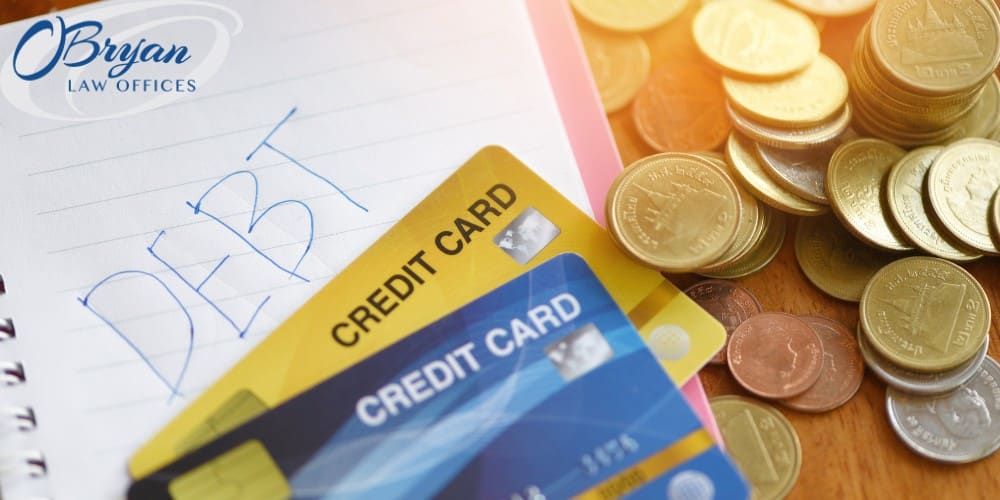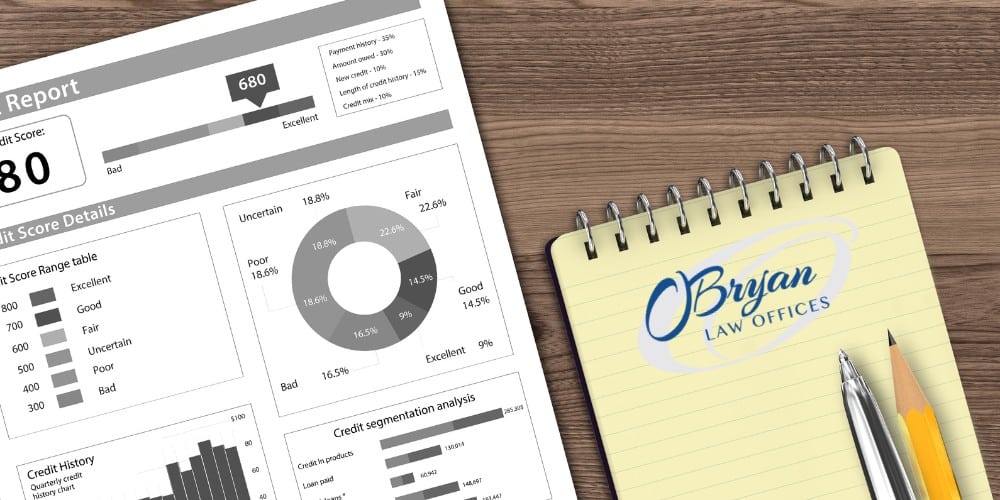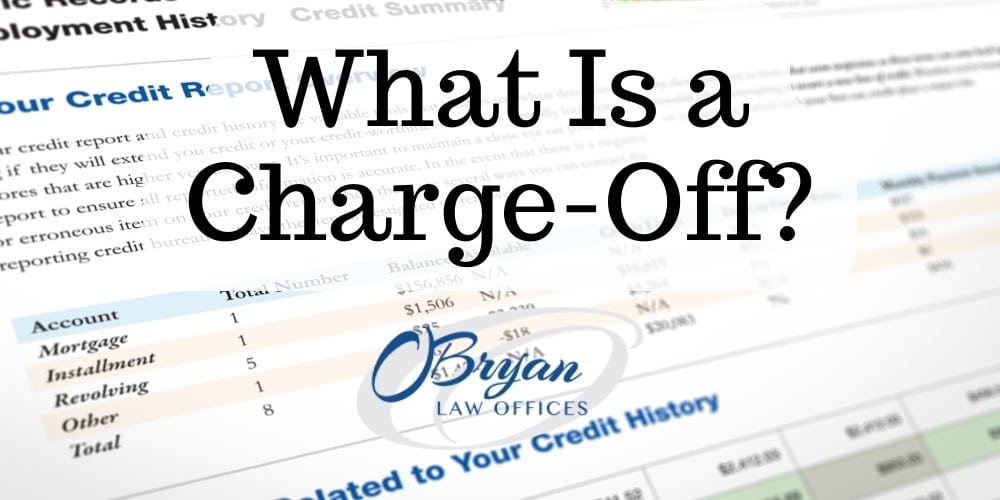Credit scores and credit reports are extremely important when it comes to making major purchases, such as when you buy a home or a car, or even when you open a new credit account. A large part of your credit score depends on your payment history, which outlines how consistently you repay your outstanding debt. Negative marks on your credit report, such as charge-offs, could severely impact your credit score. But what is a charge-off and how can it affect your credit reports? In this blog, the attorneys at O’Bryan Law Offices outline what charge-offs are, as well as how you can handle them.
At O’Bryan Law Offices, our Kentucky bankruptcy lawyers have extensive experience counseling Kentucky residents on how they can manage their unpaid debt. Having missed payments and a charge-off status on your credit report can severely damage your score. For this reason, we offer solutions that can protect you from debt collectors and give you the financial breathing room you need to improve your credit history. To schedule your free consultation with us, please call our Louisville bankruptcy office at 502-339-0222 today.
What Does Charge-Off Mean?
If you’ve fallen behind on your debt payments, you may be notified by your creditors that your unpaid debt has been charged-off. You may also see the charge-off on your credit report. Having a charge-off means that your creditor has written your charged-off account as a loss, which means they don’t expect you to pay your debts. Charged-off accounts are also closed to all future charges. After a certain period of time, your creditor may sell the charged-off account to a debt buyer or to a collection agency.
Importantly, this doesn’t mean that you are simply not responsible for the debt any longer. You are still obligated to pay charged-off accounts. However, if the creditor has sold your debt to a debt buyer or a collection agency, you will pay them instead of your original creditor. Credit reporting agencies will then begin to show the charge-off on your credit reports.
Charge-Off vs Collections
Charge-off and collections may seem similar, but they have very subtle differences. Basically, collections happen after the charge-off occurs. Your original creditor reports the charge-off to each credit reporting agency before selling it to a third-party collections agency. Once debt collectors are in control of the charged-off debt, they will begin to harass you to get you to pay. If you do not pay the third-party collection agency in a timely manner, they can file a claim against you in court. However, there are also many reasons why you should never pay a collection agency.
How Does a Charge-Off Work?

If someone’s delinquent payments continue for too long, usually at least several months, the credit card company or other creditor will mark your unpaid account as a charge-off. This is generally reserved as a last resort for creditors when they feel the debt is unlikely to be collected. They write it off as a loss for their business and report the charge-off to the credit bureaus.
Without taking prompt action, this can become a serious negative event on your credit report, which can drop your credit scores dramatically and make it more difficult for you to get good interest rates. A charge-off can happen with credit card debts, installment loans, student loans, auto loans, or personal loans.
Can I Be Charged-Off Even if I’ve Made Payments?
Yes. Even if you’ve been making payments, your creditor can mark your outstanding balance as a charge-off if you haven’t made the minimum payments. Your creditor can write off the debt as a loss and report the charge-off to the credit bureaus, even if you have made some payments, when your account is delinquent. This will negatively impact your credit reports.
How Does a Charge-Off Impact Your Credit Report?
If you have unpaid charge-offs, they may remain on your credit report for seven years after the bad debt becomes delinquent. This generally occurs around 180 days, or six months, after your account becomes delinquent. Additionally, if your debt is sold to a collection agency or debt buyer, the seven year period does not reset.
Keep in mind that the weight that a charge-off has depends on how recently it appears on your credit reports. For example, a charge-off from last month will have a much bigger impact on your credit scores than a charge-off from a few years ago. This is because the current credit scoring models put more emphasis on recent activity.
Can a Charge-Off Affect My Credit Score?
As we mentioned earlier, a charge-off is a bad debt that can stay on your credit report for up to seven years. Charge-offs are considered “major derogatory items,” which basically means that it can and likely will damage your credit score. If you make late payments on a charge-off, this can hurt your score. Other actions that can lower your credit score include having a past-due balance on a charge-off, as well as if your original creditor decides to sell the charged-off account. When a debt goes to a collections agency, an additional negative mark will be added to your credit report.
In other words, one charge-off can act as a double-edged sword and damage your credit scores more than once.
Reasons for a Charge-Off
When an original lender or creditor decides that you are unlikely to pay the debt you owe them, they will likely consider marking your account as a charge-off. Let’s say that you’ve been struggling to make on-time credit card payments. Once your credit account becomes delinquent, the credit card company will try their best to collect on the account. You’ll likely receive numerous phone calls, emails, and text messages about the delinquent account.
The original lender will likely give you six months to have the charge-off settled before they report it to the credit bureaus. Some creditors will initiate the charge-off as early as 120 days after your account becomes delinquent. They can also happen even when you’ve been making payments on the account.
This occurs when you haven’t been making the minimum payments required by your creditors, or if you have been habitually late on your payments. You may even see a charge-off after you file for bankruptcy or participate in a debt settlement plan.
Should I Pay a Charged-Off Account?
So, when you have a charge-off on your account, are you still legally responsible for paying that debt? The simple answer is yes. Regardless of whether you are paying your original creditor or a collection agency, you must still repay the debt. Even if you do end up with your charge-off paid in full, this does not guarantee an improvement in your credit score. It also does not remove the paid charge-off from your credit report.
However, there are certain benefits to paying a charge-off. Paying off these delinquent debts will make you look better when you apply for new credit in the future. If you have outstanding debts on your credit report, lenders are much less likely to approve your credit applications. Paying these debts, however, can help. Additionally, paying off these delinquent accounts reduce the amount of overall debt you have.
How Long Do Charge-Offs Stay on Your Credit Report?
Charge-offs can remain on your credit report for up to seven years after the date on which the account first became delinquent. It is possible for a debt to be reported inaccurately or for a debt to remain on your report after the seven-year period passes. If this happens, you can dispute the charge-off with the credit bureau in question and have it removed from your credit reports.
If you’re wondering, “How long does delinquency stay on credit report?”, we have a related article covering it in more depth.
Does Removing Charge-Offs Improve Your Credit Score?
While you aren’t likely to see an immediate improvement after getting a charge-off removed, you should see gradual improvement over time. This is another reason why paying a charge-off may be in your best interest. The further you are from the original date of delinquency, the less weight the charge-off will have. We recommend taking the time to focus on rebuilding your credit while the charge-off is on your report. This will not only help your credit score overall, but it will also help you look good in the eyes of future lenders.
How to Dispute Charge-Offs

If you have an incorrect charge-off on your credit report, you have options for removing it. While you cannot remove legitimate charge-offs, you can dispute those that are incorrect or inaccurate. When you discover the incorrect information on your credit report, you’ll need to contact the responsible credit bureau as soon as possible.
Begin by writing a letter of dispute to the credit bureau. Be sure to outline your identity, include the information you want to have corrected on your credit report, and explain why the charge-off is incorrect or inaccurate. Include as much information and evidence as possible in your dispute letter. This will make it much easier for the recipient to understand what you need removed.
Keep in mind that credit repair services and companies cannot legitimately remove accurate charge-offs from your credit report. If you work with a credit repair service that makes this claim, immediately run the other way. It is exceedingly difficult to have legitimate charge-offs removed from reports.
How to Get Rid of a Charge-Off
There is one way in which you can have a charge-off removed from your report, but it is very difficult to achieve. You could pursue an option called a “pay for delete.” This option involves coming to a settlement agreement with your creditor. However, you will still have to pay them. You can negotiate with the creditor to have them remove the delinquent account from your credit reports in exchange for a payment. Some creditors may be willing to accept less than the full amount of money you owe, but others won’t be so forgiving. Creditors are also not obligated to honor these requests.
Another way to get rid of a charge-off is to simply wait out the seven-year period. This negative impact will naturally and automatically fall off of your credit report once it has been delinquent for seven years. The statute of limitations on debt in Kentucky may also settle the debt for you. Speak with one of our attorneys to determine the best course of action when it comes to managing your debts.
Do You Have a Charge-Off on Your Credit Report?
If you have a charge-off on your credit report, all is not lost. Dealing with crushing debt on your own can be very daunting. That’s why our bankruptcy lawyers advocate for the power that bankruptcy has in getting rid of debts. While it may seem like the least desirable option, it’s sole purpose is to help consumers regain control of their finances. No matter how you acquired the debt that you’re struggling with, filing for Chapter 7 bankruptcy or Chapter 13 bankruptcy can be your light at the end of the tunnel.
Bankruptcy is a legitimate way to get your finances in order, and it even gives you certain legal protections that Kentucky debt consolidation, debt restructuring, cancellation of debt, and loan modification can’t give you. When you file for bankruptcy, you immediately receive the protection of the automatic stay. This allows you some breathing room, and it prevents your creditors from harassing you. Contact an experienced bankruptcy attorney to learn more about how bankruptcy can help you.
Contact O’Bryan Law Offices Today
At O’Bryan Law Offices, we understand the stress that comes with seeing negative marks on your credit report. That’s why we dedicate our practice to educating consumers all across Kentucky on the options available to them. Bankruptcy is one surefire way to receive legal protections against creditor harassment, as well as to give yourself some financial breathing room. If you’re struggling with debt and you’re no longer in good standing with your creditors, consider filing for bankruptcy protection. To schedule your free consultation with us, please call our office at 502-339-0222 today.








